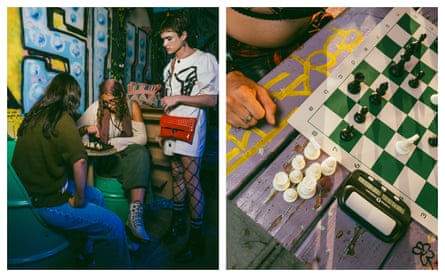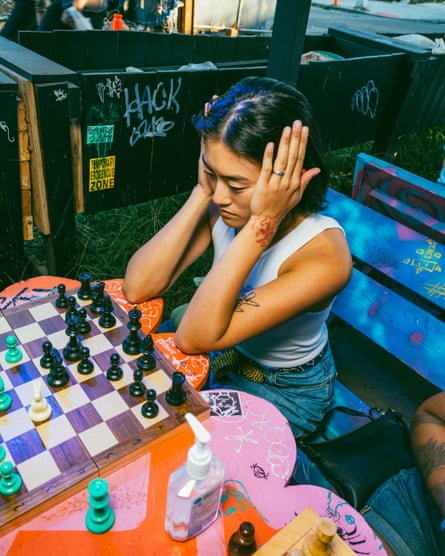In the depths of Bushwick, at Purgatory Bar, a crop of Brooklynites gathers at outside tables to play chess. Lit by pink, blue and purple “bisexual lighting”, underneath fake vines, many wear “chessy looks”: pants fashioned from checkerboard fabric, black and white prints, plentiful mesh. The mood is celebratory: players tease one another (“I’m gonna bonk your knight so hard!”) and take frequent breaks to chat, giggle and sip vodka and vermouth spritzes.
This is Queers’ Gambit, a chess night which partially came about in response to its organizers’ experiences in the broader chess scene. “Most players are cis men, and they are often visibly afraid of or disturbed by me and won’t play,” explains Niki Cross, a long-term player and genderqueer environmental justice attorney who founded the event earlier this year. At Queers’ Gambit, however, chess is inclusive, with a dedicated learners’ table, a general willingness to share knowledge and the potential for “enthusiastically consensual” flirting and cruising. The club’s Instagram tagline is “pawns r trans” and a percentage of the bar’s profits for the night is being donated to the community organization Black Trans Liberation.

“Often, you sit down at the board with a man and they’ll tell you that white goes first and immediately start explaining the game before you even say anything,” says Glo Liu, who was used to being the only woman in the room at chess meetups before she got involved with Queers’ Gambit. To combat the tendency for more experienced players to monologue about their knowledge to newbies, the event has adopted a “no mansplaining” policy and encourages supportive learning over hierarchical competition.
“I did tournaments and played more competitively, and it was very quiet and serious, and I didn’t make any friends,” says Jaxn, a chiseled player in a crop top. “If I’m somewhere for 10 hours and I don’t make a friend, something’s wrong.”

New York City is inextricably linked with the game of chess, which has been played in its parks since at least the 1940s. In Union Square, Bryant Park or Washington Square Park’s Chess Plaza, local chessmasters command checkered tables, ready to play or teach a lesson for a few bucks. Notable New Yorkers and visitors to the city, including Marcel Duchamp, Stanley Kubrick and Howard Stern, have been playing at storied institutions such as Marshall Chess Club and Chess Forum for decades. These settings are typically dominated by seasoned, older male players who approach the game with a severity that can be intimidating to outsiders.
In top tier international chess, a patriarchal perspective dominates. Discriminatory assumptions that cis men are inherently better players than women is a longstanding issue. Recently, the world’s top chess federation, the Fide, announced a range of restrictions on transgender players, including a ban on trans women competing in their women’s chess events, pending a review which could take two years.
Recently, the game has been further popularized by the pandemic success of The Queen’s Gambit, a slew of TikToks celebrating the game’s “dark academia” aesthetic and scenes of gossiping over a chessboard from this season’s Real Housewives of New York. At the same time, a number of non-traditional chess events have launched around New York City, bringing the ancient game to a chess-curious crowd, who may be more enticed by the potential to flirt over a chessboard or dress thematically than by the opportunity to boost their rating.

Simone Robert and Isabel Münter, who met through their work at a design and development studio, created Pawn Chess Club, which welcomes players of all levels to events at downtown hotspots such as Casetta and Metrograph, after noticing a dearth of beginner- and women-friendly chess spaces in Manhattan. On a recent Tuesday night at Casetta, a cafe on the Lower East Side, the explicit “beginners welcome” messaging draws a crowd, with half the bar’s patrons already deep in a game by 7.30pm, as others filter in and try to figure out how to secure a board at one of the moodily candlelit tables.
Attendees come with various skill sets and motivations. One girl mentions that the last time she played chess, the pieces doubled as shot glasses, so her understanding of the rules is a little hazy. Another newcomer says she’s here because she wants to have something to talk about with a Russian coder at work who’s a chess whiz. Someone points out that Abbi from Broad City is standing at the bar.
While Münter worked a side gig as a kids’ chess teacher throughout university, Robert has reignited a childhood interest in chess through the club. “I unlocked a core chess memory the other day,” she says. “When I was growing up in Canada, we would get cereal boxes that came with CD-ROM computer games in them. I played a lot of computer chess that was, like, animatronic Legos.”

Although the crowd is mainly well-groomed twenty- and thirtysomethings, Pawn Chess Club is technically all ages. Once, a 12-year-old named Oliver turned up with his mom. “He was smoking everyone,” says Münter. “There was a line to beat him.”
While some players sip martinis or wine, others stick to seltzer or soda to stay sharp; the shared focus of the game provides an easy way to connect with strangers without liquid courage. “It can be a bit of a party, but partying is not mandatory,” explains Robert. Atticus Hoffman, a film-maker and first-time attendee, affirms the low-key atmosphere: “The thing I found really interesting about tonight was how quiet it was during play: so much of social interaction in New York is guided by chat, chat, chat.”
Those who find that techno music helps them enter a trance-like state of focus will prefer Club Chess, a weekly-ish chess party hosted by the musician and artist Alec Luke Bahta and the writer and editor Corrine Ciani that brings together an unusual mix of chess nerds and downtown party kids, as well as those who overlap on the Venn diagram.

When I attend on a Wednesday night, they’re trying out a new venue – Mehanata Bulgarian Bar on the Lower East Side – after undisclosed issues forced them out of their previous residency at Manero’s restaraunt. It’s a chaotic, divey club, with neon lighting and a bar decorated with photos of celebrities including Elijah Wood. When questioned about non-alcoholic drink options, the gruff bartender stares in disgust and spits: “Soda!”
While the crowd includes young fashion, art and tech people, at least early in the night, chess boards are presided over by “serious chess players” – an older, male set who come equipped with their own clocks and are clearly more here for the chess than the club. “It brings a weird crowd,” explains Jay M, an enthusiastic, shaggy-haired regular who says he approaches chess devoid of strategy. “A lot of people who don’t usually go out come here to play chess. So it’s kind of an introverts’ party.”
Bahta and Ciani see the event as somewhere between performance art, a salon and an experimental party space. “Chess has always been the intellectuals’ beer pong, with people meeting up in bars to discuss politics, get drunk and play chess,” says Bahta. While I do not hear any politics chat, by 11pm the DJ is playing Sean Paul, JLo and Madonna and a gaggle of gyrating women plus a couple of nerdy onlookers have descended on the dancefloor. Most of the party is now standing outside the venue, smoking and chatting. Two women, either unable to find space upstairs or deeply invested in access to cigarettes, are crouched on the sidewalk playing on a tiny board with magnetic chess pieces.

Such scenes are not unusual. Many attendees warned me that chess can quickly become an obsession that takes over your life, particularly when the parties are this compelling.
Though I leave too early to see the night descend into all-out chaos, on a call a couple of days later, Bahta recounts how he ended the evening with “an epic best-of-three drunk chess match, with everyone around us screaming whenever someone lost a piece”. By 2am, the music was finished and the staff were cleaning up and turning on the lights, but people were still playing chess, as if possessed by a higher power. “We had to leave a board there for them,” says Ciani.